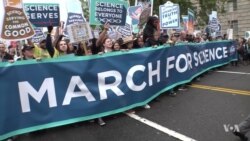Scientists on Saturday took the unprecedented step of staging marches in more than 600 cities worldwide in the face of what they see as a growing political assault on evidence-based knowledge.
Thousands of scientists and their supporters attended March for Science events in such cities as Cape Town, London, Madrid and Seoul, as well as in Australia, Brazil, Canada and Nigeria.
In Berlin, organizers said about 10,000 people marched toward the Brandenberg Gate holding up placards that read "Facts not feelings" and "We love experts — those with evidence."
Marchers in Geneva carried signs that said "Science — A Candle in the Dark" and "Science is the Answer."
In London, demonstrators marched from the Science Museum to Parliament Square in Westminster holding placards supporting science.
Watch: Scientists March in DC
New role for scientists
The March for Science thrusted scientists, who generally avoid advocacy and whose work is based on impartial experimentation, into a more visible spotlight.
For nuclear physics graduate student Chelsea Bartram, White House adviser Kellyanne Conway's "alternative facts" were the last straw.
President Donald Trump had disputed photographic evidence of the size of his inauguration crowd. Reporters challenged him, prompting Conway to respond that the administration had given "alternative facts."
"Many scientists I know, myself included, spend so many hours in the lab sacrificing enormous amounts of their life for this abstract idea" that understanding reality can benefit human civilization, said Bartram, who is pursuing a doctorate at the University of North Carolina at Chapel Hill.
"And then to have someone say, 'Well, that's not important anymore,' it's so devastating," Bartram added.
So Bartram planned to support science's role in government decisions on health, safety, the economy and more by joining demonstrators at the flagship March for Science event in Washington.
Karen Tanyer, an English teacher, and her son, Michael, 10, traveled to Washington from Efro, New Jersey, to participate in the march because "science affects everything."
"When we look at art today, it is all influenced by science and the properties of science that we've exploited to express the human spirit," Karen Tanyer told VOA.
The Washington event featured speakers and several large teach-in tents on the National Mall where scientists, educators and leaders from a variety of disciplines discussed their work, effective science communication strategies and training in public advocacy. Organizers said the event was nonpartisan and was not aimed against the Trump administration or any politician or party.
Proposed cuts to programs
Nevertheless, the March for Science was effectively a protest against steep cuts Trump has proposed for federal science and research budgets and his administration's skepticism about climate change.
The international event coincided with Earth Day, which Trump recognized by issuing a statement saying his administration was committed to supporting science and protecting the environment.
"Rigorous science is critical to my administration's efforts to achieve the twin goals of economic growth and environmental protection," the statement said.
Organizers of the March for Science said it was the first step in a global movement to acknowledge and defend the vital role science plays in everyday life.
"Science extends our lives, protects our planet, puts food on our table [and] contributes to the economy," said Caroline Weinberg, national co-chair of the March for Science.
"Policymakers threaten our present and future by ignoring scientific evidence when crafting policy, threatening scientific advancement through budget cuts and limiting the public's knowledge by silencing scientists," Weinberg said.
Dr. Mona Hanna-Attisha, a first-generation Iraqi immigrant, is the pediatrician who alerted officials in Flint, Michigan, that the city's water had been contaminated with lead. She was a March for Science honorary national co-chair.
"We march for science so that scientists have the freedom, like I did, to speak out, free from politicization and to continue to make the world a better place," Hanna-Attisha said.
Tipping point
Organizers had not released crowd size estimates by Saturday afternoon. But the dispute over crowd sizes was just one small example of what scientists see as a larger pattern.
During the U.S. presidential campaign, Trump dismissed the scientific consensus about the dangers of human-induced climate change. His appointee to lead the Environmental Protection Agency, Scott Pruitt, also does not accept climate science. He has repeatedly clashed with the agency he now heads.
But scientists say their frustration has been building for decades.
"We might have reached a tipping point now, but acting as though this is a new thing is giving too much credit to the current administration," national co-chair Weinberg said.
And it goes far beyond climate change, Weinberg added. "It's about not paying attention to the best research on things like food stamps. It's about cutting things like Head Start and after-school programs," to name a few, she said. "And that all affects health, because that's a time to set kids on the right path."
Critics said a public protest risked further politicizing science, turning scientists into just another interest group.
Bartram summed up a widespread response: On hot-button issues such as climate change, opponents have already done it. "I don't think anything we do is going to further politicize it," Weinberg said.
Disconnect
But if the goal is to get policymakers to listen, "a march isn't going to change anything," said Rob Young, head of coastal research at Western Carolina University in Cullowhee, North Carolina.
Young said much of the problem stems from the growing disconnect between scientists and voters, especially the rural and working-class people who voted for Trump.
Scientists need to get out of the lab more, he said, and explain how their work affects people's health and livelihoods.
That's what march organizers said they hoped for, too.
Geochemist Eric Davidson, president of the 60,000-member American Geophysical Union, one of the march co-sponsors, said a major post-march goal is more public engagement.
"I think the day is gone when scientists can stay in their ivory towers and assume that everyone is going to recognize their value," Davidson added.







